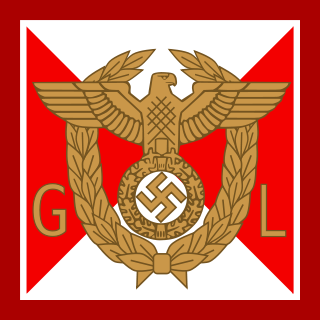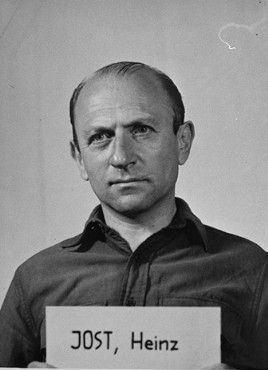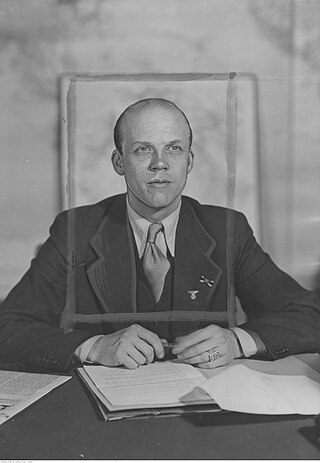The NSDAP Office of Military Policy (German: Wehrpolitisches Amt der NSDAP, W.P.A. or WPA, literally "NSDAP Office of Defense Policy" in English) was a Nazi Party organization. It was established on 8 September 1932 in a decree by Adolf Hitler, and was led by Franz Ritter von Epp. [1] His deputy was Friedrich Haselmayr who served as the general manager from September 1932 until April 1934, and then as leader of Department I, Politische Abteilung (Political Department), until October 1935. [2] The office was housed in the same building as the NSDAP Office of Foreign Affairs, headed by Alfred Rosenberg. [3]
During the remilitarization of Germany, started by the Nazis shortly after they took power, its avowed aim was to "clarify military-political questions, to conduct propaganda campaigns for the purpose of creating a belligerent spirit and a better understanding of military matters among the people, and to control all activities in the fields of military politics and sciences." [4]
This attempt to gain sole authority in all matters of defense education and training brought it into conflict with the Defense Ministry, which objected to this intrusion into its monopoly on arms-bearing. [1] As a result, it was dissolved at the end of December 1935, which did not bother Hitler; aside from the propaganda and war ministries there were also numerous other institutions and organizations already concerned with the 'remilitarization' of the German people. [1]

The Nazi Party, officially the National Socialist German Workers' Party, was a far-right political party in Germany active between 1920 and 1945 that created and supported the ideology of Nazism. Its precursor, the German Workers' Party, existed from 1919 to 1920. The Nazi Party emerged from the extremist German nationalist, racist and populist Freikorps paramilitary culture, which fought against communist uprisings in post–World War I Germany. The party was created to draw workers away from communism and into völkisch nationalism. Initially, Nazi political strategy focused on anti–big business, anti-bourgeois, and anti-capitalist rhetoric; it was later downplayed to gain the support of business leaders. By the 1930s, the party's main focus shifted to antisemitic and anti-Marxist themes. The party had little popular support until the Great Depression, when worsening living standards and widespread unemployment drove Germans into political extremism.

Hanns Kerrl was a German Nazi politician. His most prominent position, from July 1935, was that of Reichsminister of Church Affairs. He was also President of the Prussian Landtag (1932–1933) and head of the Zweckverband Reichsparteitag Nürnberg and in that capacity edited a number of Nuremberg rally yearbooks.

A Gauleiter was a regional leader of the Nazi Party (NSDAP) who served as the head of a Gau or Reichsgau. Gauleiter was the third-highest rank in the Nazi political leadership, subordinate only to Reichsleiter and to the Führer himself. The position was effectively abolished with the fall of the Nazi regime on 8 May 1945.

The Party Chancellery, was the name of the head office for the German Nazi Party (NSDAP), designated as such on 12 May 1941. The office existed previously as the Staff of the Deputy Führer but was renamed after Rudolf Hess flew to Scotland in an attempt to negotiate a peace agreement without Adolf Hitler's authorization. Hess was denounced by Hitler, his former office was dissolved, and the new Party Chancellery was formed in its place under Hess' former deputy, Martin Bormann.

Hermann Esser was an early member of the Nazi Party (NSDAP). A journalist, Esser was the editor of the Nazi paper, Völkischer Beobachter, a Propaganda Leader, and a Vice President of the Reichstag. In the early days of the party, he was a de facto deputy of Adolf Hitler. As one of Hitler's earliest followers and friends, he held influential positions in the party during the Weimar Republic, but increasingly lost influence during the Nazi era.
This is a list of words, terms, concepts and slogans of Nazi Germany used in the historiography covering the Nazi regime. Some words were coined by Adolf Hitler and other Nazi Party members. Other words and concepts were borrowed and appropriated, and other terms were already in use during the Weimar Republic. Finally, some are taken from Germany's cultural tradition.

Karl August Hanke was an official of the Nazi Party (NSDAP) during its rule over Germany who served as the fifth and final Reichsführer of the Schutzstaffel (SS). He also served as Gauleiter of Gau Lower Silesia from 1941 to 1945 and as Oberpräsident of the Prussian Province of Lower Silesia. Captured on 6 May 1945, he was shot and wounded during an escape attempt and then beaten to death by Czech guards on 8 June, after the war had ended.
Reichsleiter was the second-highest political rank in the Nazi Party (NSDAP), subordinate only to the office of Führer. Reichsleiter also functioned as a paramilitary rank within the NSDAP and was the highest rank attainable in any Nazi organisation.

The Federal Foreign Office, abbreviated AA, is the foreign ministry of the Federal Republic of Germany, a federal agency responsible for both the country's foreign policy and its relationship with the European Union. It is a cabinet-level ministry. Since December 2021, Annalena Baerbock has served as Foreign Minister, succeeding Heiko Maas. The primary seat of the ministry is at the Werderscher Markt square in the Mitte district, the historic centre of Berlin.

The Nazi Party/Foreign Organization was a branch of the Nazi Party and the 43rd and only non-territorial Gau ("region") of the Party. In German, the organization is referred to as NSDAP/AO, "AO" being the abbreviation of the German compound word Auslands-Organisation. Although Auslands-Organisation would be correctly written as one word, the Nazis chose an obsolete spelling with a hyphen.

The Office of Racial Policy was a department of the Nazi Party (NSDAP) that was founded for "unifying and supervising all indoctrination and propaganda work in the field of population and racial politics". It began in 1933 as the Nazi Party Office for Enlightenment on Population Policy and Racial Welfare. By 1935, it had been renamed to the Nazi Party Office of Racial Policy.

The remilitarisation of the Rhineland began on 7 March 1936, when military forces of the German Reich entered the Rhineland, which directly contravened the Treaty of Versailles and the Locarno Treaties. Neither France nor Britain was prepared for a military response, so they did not act. After 1939, commentators often said that a strong military move in 1936 might have ruined the expansionist plans of Adolf Hitler, the dictator of Germany. However, recent historiography agrees that both public and elite opinion in Britain and France strongly opposed a military intervention, and neither had an army prepared to move in.

The government of Nazi Germany was a totalitarian dictatorship governed by Adolf Hitler and the Nazi Party according to the Führerprinzip. Nazi Germany was established in January 1933 with the appointment of Adolf Hitler as Chancellor of Germany, followed by suspension of basic rights with the Reichstag Fire Decree and the Enabling Act which gave Hitler's regime the power to pass and enforce laws without the involvement of the Reichstag or German president, and de facto ended with Germany's surrender in World War II on 8 May 1945 and de jure ended with the Berlin Declaration on 5 June 1945.

Heinz Jost was a German SS functionary during the Nazi era. He was involved in espionage matters as the Sicherheitsdienst or (SD) section chief of office VI of the Reich Security Main Office. Jost was responsible for genocide in eastern Europe as commander of Einsatzgruppe A from March–September 1942.

Ulrich Fleischhauer was a leading publisher of antisemitic books and news articles reporting on a perceived Judeo-Masonic conspiracy theory and "nefarious plots" by clandestine Jewish interests to dominate the world.
The NSDAP Office of Colonial Policy was a Nazi Party office formed in 1934. Its stated objective was to formulate plans for the re-taking of the former German colonies. The office lost much of its meaning after the start of World War II, and was dissolved after the reversal of Nazi Germany's military victories in 1943.

Amt Rosenberg was an official body for cultural policy and surveillance within the Nazi party, headed by Alfred Rosenberg. It was established in 1934 under the name of Dienststelle Rosenberg, with offices at Margarethenstraße 17 in Berlin, to the west of Potsdamer Platz. Due to the long official name of Rosenberg's function, Beauftragter des Führers für die gesamte geistige und weltanschauliche Erziehung der NSDAP, the short description Reichsüberwachungsamt "Reich surveillance office" was used alongside, also shortened simply to Überwachungsamt "surveillance office".

The NSDAP Office of Foreign Affairs was a Nazi Party organization. It was set up in April 1933 in the Hotel Adlon in Berlin immediately after the Nazi Machtergreifung. It was led by Alfred Rosenberg. It was one of the central authorities for the foreign policy of Nazi Germany, alongside the Foreign Office (AA) under the leadership of Neurath, the Nazi Party's Auslandsorganisation (NSDAP/AO) of Ernst Wilhelm Bohle, Joachim von Ribbentrop's special bureau and part of the Ministry of Public Enlightenment and Propaganda (RMVP) under Joseph Goebbels.

Karl Bömer was a German ministerial director and the head of the Foreign Department for Journalism in the Ministry of Propaganda. His accidental hint at German plans to invade the USSR led to his arrest by the Gestapo in May 1941. Subsequently, he fought on the Eastern Front in 1942 and sustained injuries near Kharkov; Bömer died in a military hospital in Kraków.